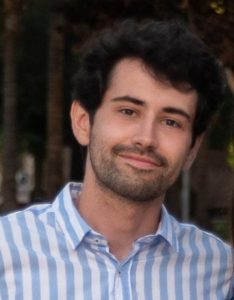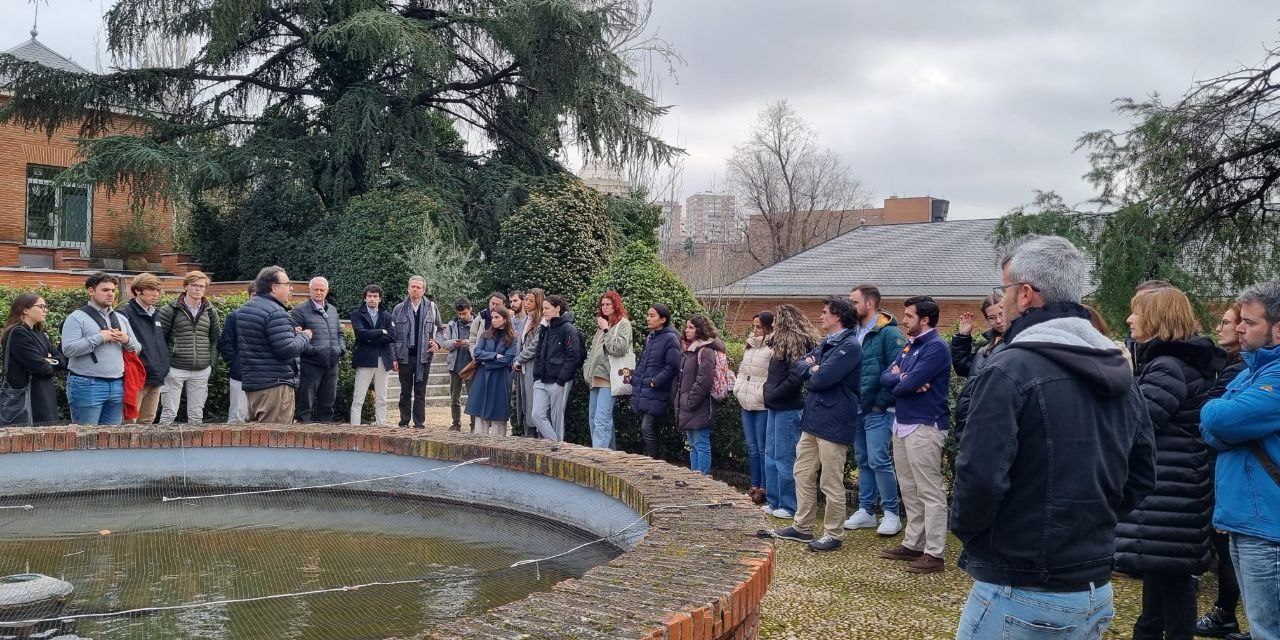Students from the ETSI of Montes, Forestal y del Medio Natural and the ETSI Agronómica, Alimentaria y de Biosistemas participate in a pilot project to certify the welfare of rainbow trout. This challenge-based learning initiative is in addition to the 31 that the Universidad Politécnica de Madrid is launching this course within the framework of the EELISA alliance to transform engineering education.
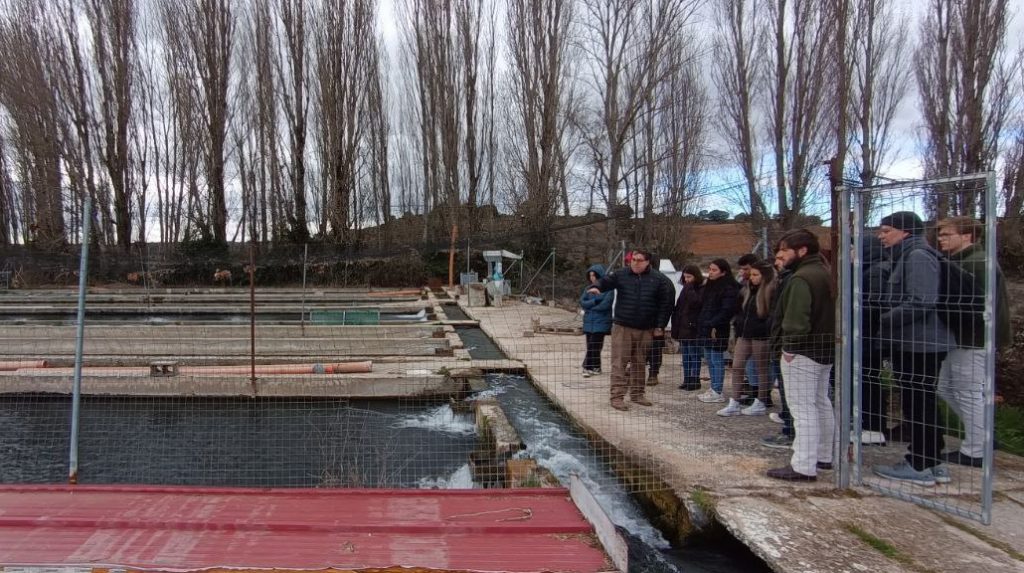
Why should we care about animal welfare? Beyond the ethical and moral consideration that all living beings deserve to be treated with respect, human beings have a responsibility to preserve the planet we share for our own survival, so that we can exploit its resources in the most sustainable way possible. In fish farms, which have played a major role in the global food system for more than 20 years, studies show that less stressed fish, grow better and get sick less, resulting in a higher quality product and business and environmental sustainability. The problem arises when, even though the benefits of sustainable fish farming are known, the industry does not know how to implement it.
Taking advantage of this opportunity, a group of UPM Aquaculture students is participating in a pilot project whose objective is to develop a certificate for the welfare of rainbow trout, following the challenge-based learning methodology. The approach is practical and transversal. While students learn by doing, they solve a real problem in the industry. These challenges, called EELISA Challenges to be developed within the framework of this alliance, have been introduced this year into the curriculum of 60 subjects of official studies with the purpose of continuing them in the coming years to transform engineering education, a long-term objective of EELISA.
The kick-off took place in September at the ETSI of Montes, Forestal y del Medio Natural (ETSIMFMN) with the Aquaculture students of the Bachelor’s Degree in Forestry Engineering and the Master’s Degree in Water in the Natural Environment. Uses and management. Let’s start with the basics: a couple of talks, theoretical sessions, and some surveys to find out the students’ perception of aquaculture, fish welfare and certification. Afterwards, each student repeated this survey to the people around them, collecting more than 200, and we put them in contact with the industry through a visit to the collaborating fish farm Cien Fuentes, in Cinfuentes, Guadalajara, where its manager Joaquín Checa showed us in detail its facilities. It was a very enriching, realistic, and interesting experience for the students, who took notes to carry out a series of projects based on that real experience and obtaining some technical indicators that can help build the certification that the Challenge pursues. This was really the litmus test, as here we would see the involvement and real interest of the students in the challenge. And it was a success.
We spoke with Álvaro De la Llave Propín, PhD candidate in Agro-Environmental Technology for Sustainable Agriculture at the UPM and supervisor of this challenge, to find out how it is developing.
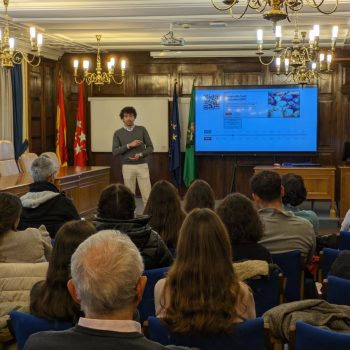
“The EELISA Challenge, entitled Challenge based learning in Aquaculture: how to certify trout welfare, addresses certifications that assess the animal welfare of fish in fish farms from a training perspective without forgetting the real situation of the industry, which is unaware of a wide range of technical indicators. as well as consumer opinions. The Challenge is split into two phases and brings together students from two UPM schools, coordinated by professors Morris Villarroel Robinson and Fernando Torrent Bravo, as well as by myself, Álvaro De la Llave Propín.
In the second semester, the students who are studying Aquaculture of the Degree in Agricultural Sciences at the ETSI Agronómica, Alimentaria y de Biosistemas(ETSIAAB) came into action. In this case we proceeded in a similar way, but we also decided to organize an event in Montes on February 13 to present the first stage and recognize the students who had started the Challenge with a guided tour of the school’s fish farm. There, ETSIMFMN professor and researcher María Dolores Bejarano Carrión presented Greenchannel, a project that generates a mesocosm – an experimental open-air river ecosystem – to study the well-being of natural rainbow trout under controlled conditions. To close the day, the group savored a tasting session of certified aquaculture products focused on different salmonid by-products (salmon and rainbow trout), with the additional collaboration of the Alcampo company. Today, the challenge continues, and they will soon receive the visit of Professor Dr. Ranka Junge from the ZHAW aquaculture group in Switzerland, with extensive experience in the aquaculture and aquaponics sector.”
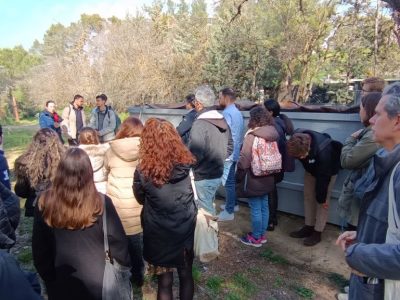
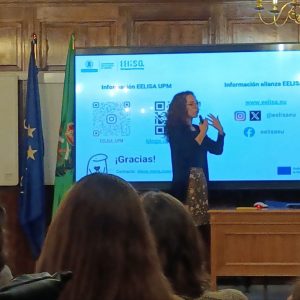
For Álvaro, EELISA offers a unique opportunity to pursue sustainable consumption and production, one of the Sustainable Development Goals, through educational innovation. “It is like opening a box full of surprises, in which each step implies a reformulation of the classic concept of learning in a multidisciplinary and realistic environment, which stimulates the ability to adapt and cooperate. Introducing this type of less theoretical learning than usual into an entire course, with the constant participation of a company in the sector, has a great effect on the involvement and academic results of the students”.
Álvaro de la Llave Propín and Elena Mora Cuesta (EELISA Communication Officer at the UPM)
More about Álvaro
Álvaro De la Llave Propín has a Bachelor’s Degree in Agronomic Engineering from the Polytechnic University of Madrid, a Master’s Degree in Animal Production and Health from the Polytechnic University of Madrid and the Complutense University of Madrid, and a University Expert Certification in Animal Welfare during Transport from the TECH Technological University. Currently, he is pursuing a PhD in Agro-Environmental Technology for Sustainable Agriculture at UPM, focusing on the optimization of processes during the grouping and fishing of rainbow trout and its impact on meat welfare and quality. Additionally, he oversees the EELISA Challenge “CBL in Aquaculture: how to certify trout welfare“, an initiative aimed at developing certifications to assess fish welfare in aquaculture environments. In addition, he is an active member of the EELISA Community “Sustainable Food Production” (SFP).
